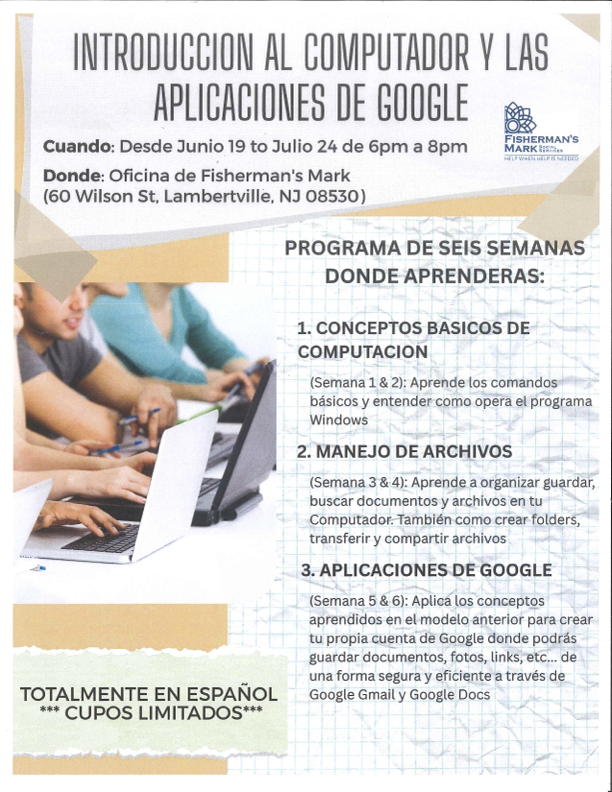Each Thursday evening from 6 to 8 PM for six weeks, a small but dedicated group gathers in the Fisherman’s Mark 60 Wilson Street office for something that’s increasingly essential in today’s world: digital literacy. The six-week course, Introducción al Computador y las Aplicaciones de Google, offers Spanish-speaking adults a chance to build computer skills that support their daily lives—and maybe even their dreams.
Led by longtime educator and bilingual technologist Andrew Budwig (a volunteer), the class covers everything from computer basics to creating a Google account, using Google Docs and other Google Apps. The curriculum is based on the group’s interests and needs. One participant even asked how to create a website that could accept payments for her small business. That’s the kind of goal I love to help with.”
“Most participants are pretty handy with smartphones,” Andrew explained. “They pay bills, check their bank accounts, and send messages—but working on a computer is new for most. Participants can take the Chromebooks home to practice using a keyboard and touchpad.
Each session builds on the last, but flexibility is key. Andrew adapts as he learns more about what the participants already know and what they want to learn. The group recently used Google Meet for the first time and practiced uploading photos from their phones to view on a larger screen—an exciting breakthrough for many.
The need for computer classes emerged directly from our recent ESL programming, further reinforcing our commitment to responsive, community-driven services. The class is conducted entirely in Spanish and reflects Fisherman’s Mark’s commitment to culturally relevant programming. Participants use Chromebooks during class, which were purchased through a generous grant from Thompson Memorial Presbyterian Church.
The current group includes several women from Mexico and one participant from Ecuador, plus a younger man who has offered to assist his peers.
“It’s fun,” Andrew said. “I like the people, and I want to make sure they get something meaningful out of it. If even one person uses what they’ve learned, I’ll be happy.”
Andrew brings deep expertise to the classroom. He spent 25 years working for a software company with clients across Latin America, and holds a PhD in musicology. His teaching experience spans boarding schools and colleges, and he’s adept at helping adult learners find practical, hands-on ways to build skills.
Fisherman’s Mark Executive Director Jennifer Williford expressed gratitude for his leadership: “We’re always looking for ways to meet the needs of our program participants. Andrew’s knowledge, passion, and bilingual ability make this class an incredibly valuable resource for our community.”
Several participants are especially interested in improving their English so Andrew showed them DuoLingo, Coffee Break English (free online resources) and Google Translate. With a few weeks remaining in the course, participants are already asking about what comes next.
Whether it’s learning to manage files, navigate Gmail, or explore business tools, this pilot program is proving that digital inclusion can open doors—for individuals and for the community.
To learn more about Fisherman’s Mark Social Services, visit www.fishermansmark.org
